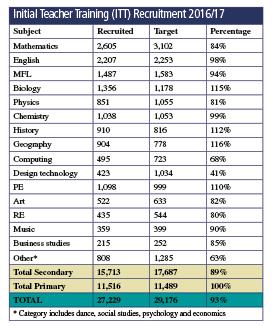There is no end in sight for the teacher recruitment crisis after the latest teacher training figures revealed that Department for Education (DfE) targets have been missed for the fourth year in succession.
At secondary level, only four subjects managed to recruit in excess of their targets, with key disciplines such as computing, physics and mathematics falling well short.
Within the figures, the target for the recruitment of teachers in EBacc subjects was missed by around 700 (11,853 recruited against a target of 12,541). Non-EBacc subjects have been hit particularly hard, missing their collective recruitment target of 5,146 teachers by 25 per cent (3,860 recruited).
The figures come from the Initial Teacher Training Census for the 2016/17 academic year and represent the numbers of new entrants to post-graduate ITT courses. They are compiled across a range of entry routes, including school-led training courses, such as Teach First, School Direct and School-Centred ITT, as well as the university-led post-graduate (PGCE) courses.
At secondary level in 2016/17, a total of 15,713 trainee teachers were recruited to post-graduate ITT courses – only 89 per cent of the target of 17,687. At primary level, 11,516 teachers have been recruited against the target of 11,489.
When broken down by subject, only geography (116 per cent), biology (115 per cent), history (112 per cent) and PE (110 per cent) over-recruited at secondary level.
Subjects including chemistry, English, drama and modern foreign languages fell just short of their targets. More badly hit were subjects including mathematics (84 per cent recruited against target), art/design (82 per cent), physics (81 per cent), RE (80 per cent), computing (68 per cent), and design technology (41 per cent).

This week has seen further warnings that there are likely to be shortages of teachers even in subjects which have met their trainee targets because not enough teachers have been trained over previous years.
The new figures have caused universal concern, sparking renewed appeals to government to take action on recruitment, including tackling “increasingly uncompetitive salaries” and issues of workload.
Malcolm Trobe, interim general secretary of the Association of School and College Leaders, said it had to be education secretary Justine Greening’s top priority. He continued: “It is very concerning that the target for recruitment to initial teacher training courses has been missed again, particularly when we have concerns that this target is not sufficient to meet the demand for new teachers in the first place.
“There is a need to simplify the routes into teaching, including making it more straightforward for potential trainees to apply. The DfE should enable a broad-based discussion, led by the profession, to work with the department to develop an overarching strategy for teacher recruitment and retention.”
Dr Mary Bousted, general secretary of the Association of Teachers and Lecturers, said ministers needed to acknowledge the problems the sector is facing: “Any ministers who continue to bury their heads in the sand over the crisis in teacher recruitment and retention, while allotting funding to expansion of selective schools, will show a total lack of understanding about the desperate and urgent need for teachers in our schools.
“Years of underfilling training places, increasingly uncompetitive salaries and rising workload exacerbated by fundamental changes to the curriculum, exams and tests have fuelled the current recruitment and retention crisis which the government has refused to acknowledge for far too long.”
Russell Hobby, general secretary of the National Association of Head Teachers, warned that schools will struggle to deliver on the EBacc agenda if recruitment doesn’t improve. He said: “The shortage in EBacc subjects is particularly concerning: 84 per cent of the required mathematics trainees were recruited and just 68 per cent for computing. The government will find it hard to meet their target to ensure 90 per cent of pupils take the EBacc.
“For French and German GCSEs, we know from this year’s data that 77.7 per cent of those pupils who entered four out of the five EBacc components were missing the languages component.”
Elsewhere, the figures showed that of the total number of recruits, 32 per cent were male, 53 per cent were aged under-25, and 15 per cent were from a minority ethnic group.
